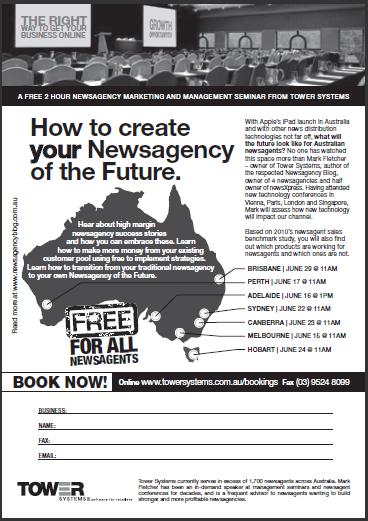I am often asked by people looking at buying a newsagency why they should given the issues and challenges discussed here and elsewhere.
In my view, a newsagency represents a good investment and offers good opportunities, plenty of upside – despite some challenges presented by out of date practices. The value in theupside is why I have expanded my own involvement.
There is plenty about a newsagency business you can control.
There are excellent new traffic opportunities: ink, books, gifts, services and some other new products areas I am not prepared to name here just yet. These are brining new customers in.
There are excellent sales efficiency opportunities – selling more to existing customers. This is achieved by cleverly leveraging high traffic products such as newspapers, lotteries and major magazine titles to drive impulse purchases.
There are good margin opportunities. For example, ditching magazine company calendars in favour of dealing with calendar specialists – newsagents more than double their margin.
Proactive newsagents can transform the business. This is where the biggest opportunity lies. By respecting existing key traffic generators and evolving the business offer in other categories, smart retailers can significantly increase sales and profit. Yes the traditional newsagency is old and tired. The new newsagency is vibrant and profitable.
Change. Yes technologies like the iPad will impact our businesses. This will be more in a good way than a bad way. Entrepreneurial newsagents are seizing the opportunity of change and using this to motivate internal change. There are newsagents making good money from cafe services, online businesses and expanded distribution businesses.
So, why would I buy a newsagency today? The opportunity!
The only caveat I would apply is that you need to buy at the right price.
I will be covering the themes in this blog post in detail at the Newsagency of the Future workshop next month.
 Venue details have now been announced for most of the free Newsagency of the Future workshops which commence next Tuesday in Melbourne. The details for next week are: Melbourne – 15th June 2010 @ 11:00am, The Brighton Savoy, 150 The Esplanade, BRIGHTON VIC 3186. Adelaide – 16th June 2010 @ 2:00pm, Grand Chifley Adelaide, 208 South Terrace, ADELAIDE SA 5000. Perth – 17th June 2010 @ 11:00am, Metro Hotel Perth, 61 Canning Highway, SOUTH PERTH WA 6151.
Venue details have now been announced for most of the free Newsagency of the Future workshops which commence next Tuesday in Melbourne. The details for next week are: Melbourne – 15th June 2010 @ 11:00am, The Brighton Savoy, 150 The Esplanade, BRIGHTON VIC 3186. Adelaide – 16th June 2010 @ 2:00pm, Grand Chifley Adelaide, 208 South Terrace, ADELAIDE SA 5000. Perth – 17th June 2010 @ 11:00am, Metro Hotel Perth, 61 Canning Highway, SOUTH PERTH WA 6151.